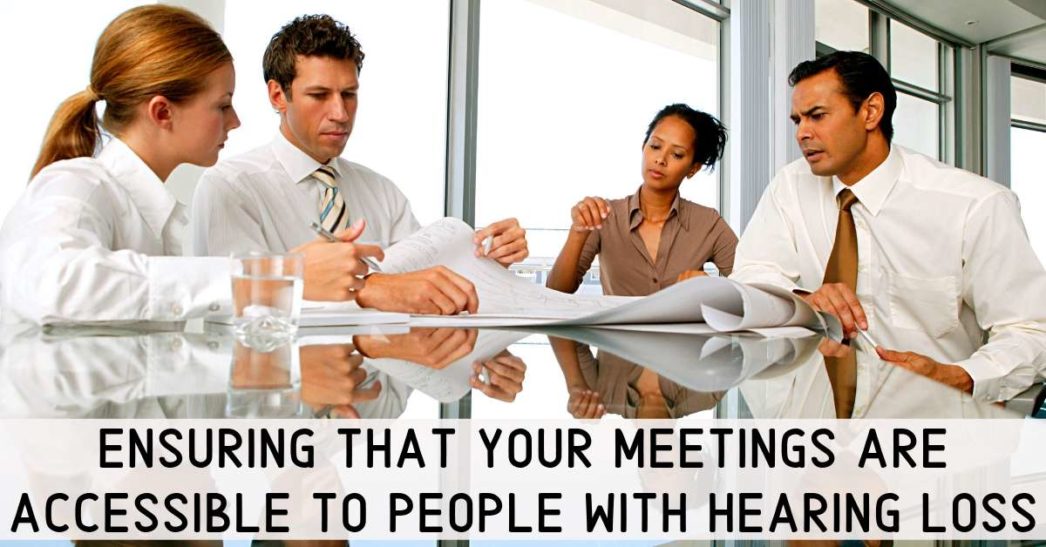Ensuring That Your Meetings Are Accessible to People with Hearing Loss
Dealing with hearing loss is a struggle that can frustrate the strongest person. Hearing devices are great and they improve the quality of life of the hearing impaired. But even with hearing aids, there are some issues at times. And, many of those who should be using hearing aids – don’t. At Comprehensive Ear & Hearing we encourage everyone to get a regular hearing exam and we especially encourage a hearing exam if you think you have hearing loss. What many people don’t realize is – the high number of those with hearing loss that don’t or won’t get treatment – and the fact that many of those people are in the workforce. About 20% of American adults have some hearing loss and about 60% of those with hearing loss are still in the workforce.
If you run meetings or conventions, there are some guidelines to think about if you want to make sure everyone gets the full benefit of the gathering and the information the speakers may have. Here are some guidelines to ensure accessibility
Technology is Your FriendOne of the biggest barriers to making a meeting or convention accessible is not realizing there are those in attendance with hearing disabilities. Not making sure your meeting is accessible to everyone could be a violation of the Americans with Disabilities Act. So, it’s a good idea to make sure the gathering is open and useful for all.
Many hearing-impaired individuals don’t use sign language. They are likely used to captioning or what it is sometimes referred to as CART Captioning or CART. CART stands for Communications Access Realtime Translation.
Making sure you and the people in your firm that organize and run large meetings have knowledge of accommodating disabilities is a great skill. With proper training and use of technology, you can make your event an accessible success!
Make No Assumptions
Don’t assume ever hearing-impaired person who may be in the room knows sign language. Some may have lost hearing later in life and never bothered to pick up sign language – some likely aren’t admitting to anyone that they may have hearing issues.
Don’t assume a hearing-impaired individual that seems to communicate fine in an office setting will not have issues at a large gathering. In a small office where you may be facing someone while you are talking and there isn’t a lot of background noise, they may not have issues. Add space, distance, 50 to 100 more people, and those people talking and asking questions, and you won’t have that same level of comprehension.
Embrace the Cell Phone
It’s nearly impossible to find someone who doesn’t have a cell phone and its quite impossible to find someone who is functioning in the workforce without a cell phone. A cell phone can provide a simple and subtle technological solution to accessibility. With the proper training for those running the meeting or gathering, you can set up a remote captioning feed that will transmit to cell phones. Those at the event can participate and view the captions real-time on their phones. And, you will find there are those who are not hearing impaired that use the close captioning as a useful concentration tool! You can hire a professional captioner or train your own people to do the captioning. However, training is needed. There has to be prep materials and the captioners have to be quick and accurate to make sure “real time” stays real time and the captions capture what is going on. Don’t rely on your speaker to be able to do the captioning, either. It’s difficult enough to carry on a presentation to a large group without having to worry about captioning at the same time. That being said, many professional speakers may already have a caption set for their presentation that you can use
Some Other Advice
Use a headset not a speaker phone for teleconferences in the workplace. Everyone should have their own headset. For someone with hearing issues, trying to listen and process the sound from a speaker phone is frustrating and it defies the definition of “accessible.” If you are getting or giving detailed instructions or plans for a project out over a speaker phone, you run the risk of much of that information to some individuals getting lost in the processing.
Comprehensive Ear and Hearing
At Comprehensive Ear and Hearing, we can help individuals with assistive listening devices and, as always, we stand ready to help you continue enjoying life and all of the hearing experiences it has to offer you. Call today for a hearing consultation.


